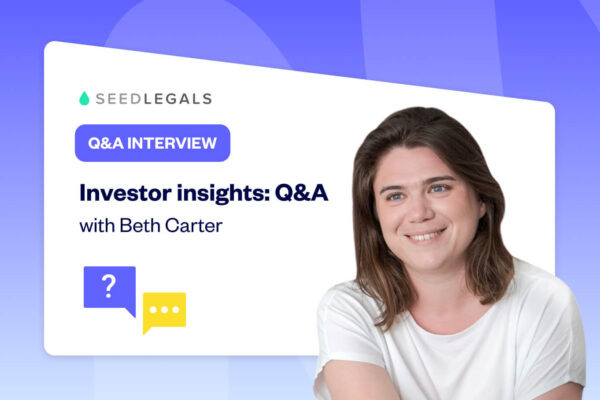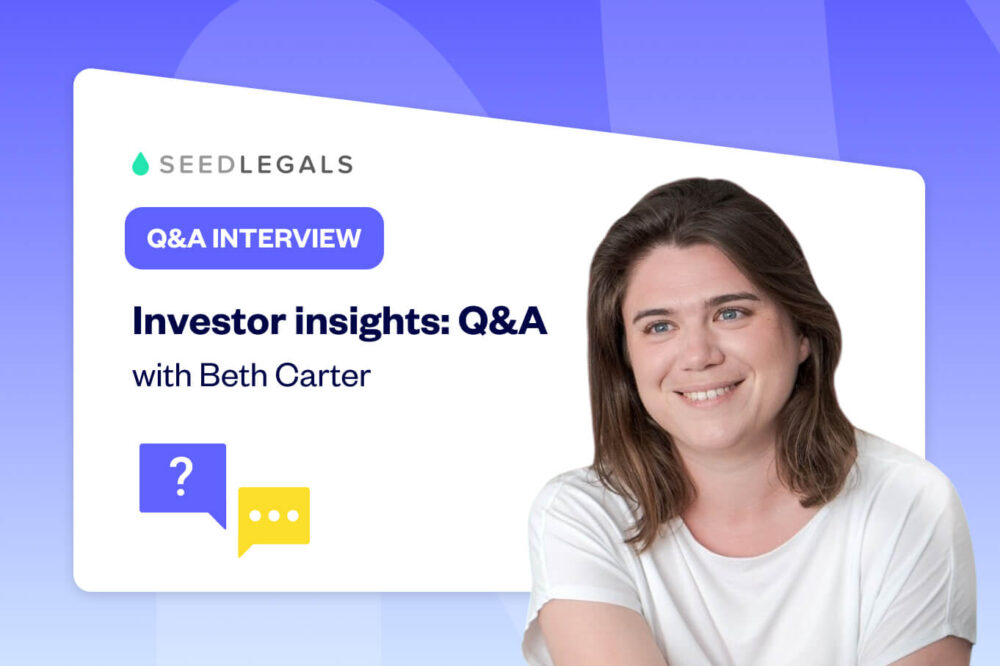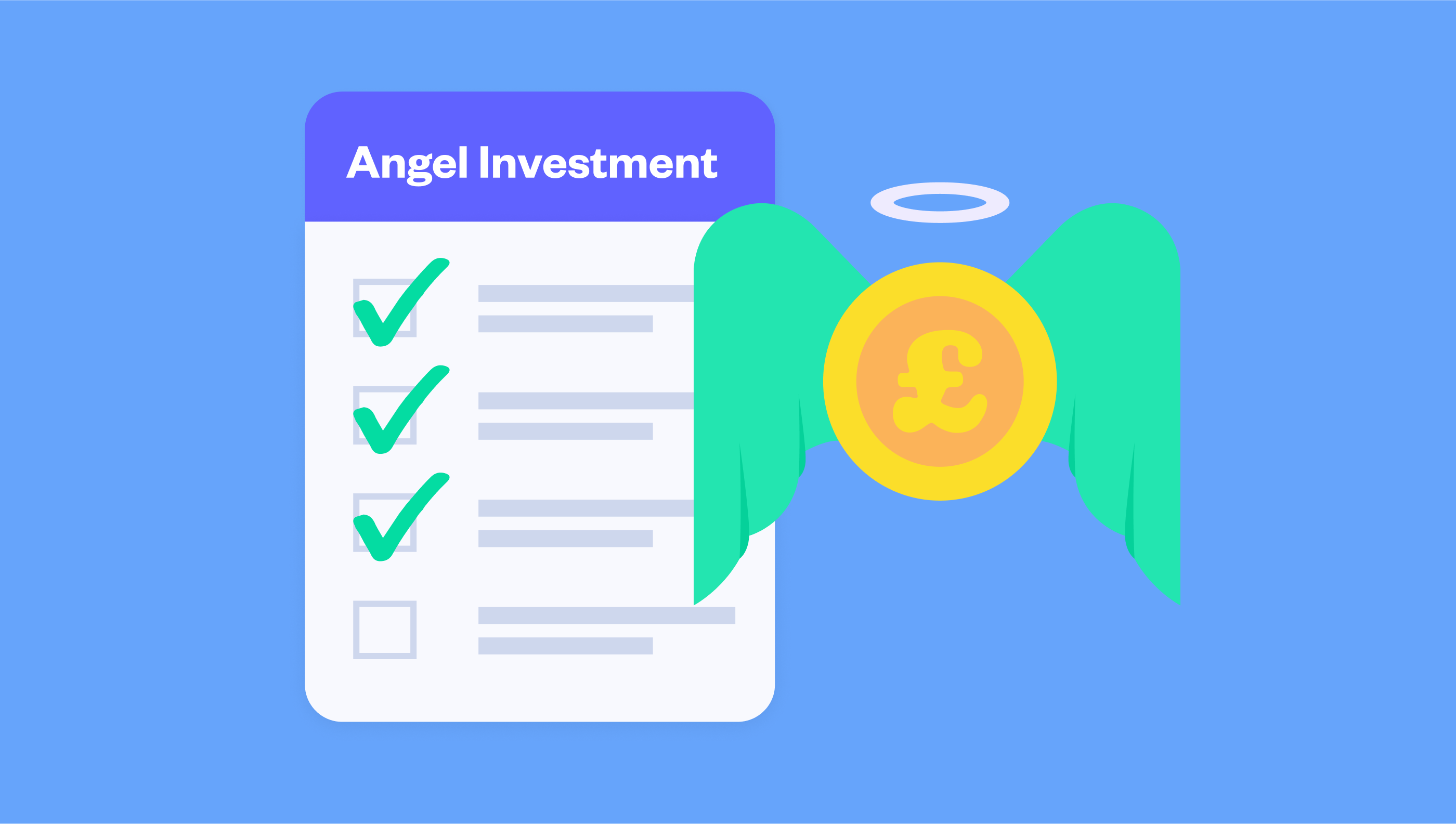Insights from a startup investor: Cam Ross from Green Angel Ventures
Investor Cam Ross from Green Angel Ventures shares insights on funding, founding, the value of syndicates & more.


“Angel investing is a vote. For what you want to see succeed and change the world for the better.” That’s growth expert Beth Carter’s philosophy and part of what inspired her to become an angel investor focused on impact.
Beth’s unique perspective is shaped by years of working in startups in a variety of roles, launching go-to-market strategies and coaching founders. She’s currently a Director of Growth at Flexa, Growth Coach at SYSTM, Angel Investor at Nodes Ventures…. and an amateur golfer.
She generously shared with us her unique insights on angel investing and early stage startup growth. Check it out 👇
Five-minute video lessons delivered daily by email. Expertise from thousands of startup investments. Loads of bonus content.
Sign up now
Q: Beth, start by telling us a bit about your background and journey to becoming an angel investor?
Beth Carter: My background is really rooted in growth and go-to-market strategy and I’ve been in the tech space for a long time now.
I’ve pretty much always worked in startups. There was one (very) brief stint in the corporate world but, especially at that time in my life, startups felt more where I belong. I’ve worked across almost every part of the business – marketing, sales, product, revenue, and customer insights. Growth is all about understanding the full picture, the different funnels, and customer journeys.
Beyond my day-to-day work, I coach on a growth accelerator called SYSTM. It’s so rewarding – I get to meet amazing founders and help them figure out the growth processes that will really shape the path of their business. Some of these founder relationships extend longer term into a growth coaching relationship – I have one founder who I’ve worked with for over two years now, and we still speak every Monday. And, of course, I’m also an angel investor.
Q: What inspired you to focus on growth?
Beth Carter: Not long after university, I started a small business with a friend and this made me realise how much I love seeing the full picture and finding solutions to questions like What are we gonna build? Who are we building it for? How do we sell it to them? How do we grow the business? And this ultimately led me to focus on that growth aspect.
I found Matt Lerner’s program SYSTM and went through it myself as a company. During the program I thought to myself, I LOVE this! This is what I’ve been missing – that broader picture of a company. It resonated so much. I thought, I’d love to come back and coach on this program. A year later Matt invited me to become a coach. By that point I’d taken on growth roles in other businesses too.
Beth CarterGrowth can be such a difficult function to define. A startup isn’t just about marketing, or product, or sales – it’s a sum of how all of these elements interact and work together. All of which need to be rooted in an understanding of what resonates with customers and knowing how to pivot when something doesn’t work. I love having that wide view of a business and the problem space, and being able to zoom in and out to work on the most impactful things.
Director of Growth,
Q: What an inspiring career moment! So then what motivated you to start angel investing?
Beth Carter: A lot of the reason I invest is because I really love people. Founders are, at the core of it, a group of super smart people trying to do cool things. Playing any small role in moving that forwards is exciting.
But I’m also obsessed with the future. I think you have to be as an early stage investor. Being able to invest is a massive privilege, but it’s also a huge responsibility.
Beth CarterI believe that choosing who to give your money to as an investor is a vote. Who and what you choose to support, with your money and your time, is a vote for a certain type of future.
When I’m thinking about what I want to invest in, I ask myself, ‘If this company becomes hugely successful, would I be pleased with the resulting impact on the world?’
Director of Growth,
Q: Do you feel like your background in growth and go-to-market helps with angel investing and vice versa?
Absolutely! I really felt that seeing startups from both sides would make me better at growth as a whole. As a growth person working in early stage startups, one of the things we’re optimising for is how to raise the next round. And I thought, Well if I know as an investor what I’m looking at, then I’ll understand it better for startups. From working in growth, I have a very realistic understanding of what’s achievable. So during the investment process, I can easily tell if people are overexaggerating and if what founders are pitching is realistic.
I’ve learned tons from angel investing about how to look at companies more deeply and how to understand companies and founders, and it’s this amazing circle of learning and understanding.
Q: Are there any specific industries that interest you most as an investor?
Beth Carter: Yes! At the moment I’m really focused on climate, deeptech, and health. The amount that I get to learn by speaking to founders in these spaces and understanding the work they’re doing is so compelling to me. And if we go back to that concept of your investments being a ‘vote’ for the future – these are the most important sectors to me.
Q: What guidelines do you use to make an investment decision?
Beth Carter: Well, I’m a very early stage investor. And the earlier you invest, the less you can rely on metrics. A lot of it is about ambition, dream and potential at this stage. So what I really have to answer for myself is, Does this idea make sense to me? What’s the bet that I’m making? And then what I do is look outside of the product, at things going on around it. The third, fourth, fifth degree consequences. Things like:
Beth CarterAnd then I listen to my gut feel. Which isn’t just unsubstantiated intuition. Gut feel is pattern recognition, honed from all the knowledge and experience you’ve built up.
Director of Growth,
Q: In addition to impact, what do you look for in a startup?
Beth Carter: When I’m considering an investment, I look for a balance between big, inspiring ideas and practical, sustainable execution plans. It’s that think big, start small thing.
The idea has to be exciting of course, but how is that going to become reality? It’s a cliche now to say that it’s ‘all about the founders’ – but it is a massive factor you can’t ignore. I’m looking for raw intelligence, the ability to see and understand multi-layered consequences, and honestly, someone I enjoy getting to know and working with.
Beth CarterI like to see a real focus on understanding the customer – which is even more important if you don’t have any customers yet! How many potential customers have you spoken to? How are you learning about them? What have you learnt? What are they currently using to solve the problem you’re trying to solve? That’s the stuff I want to see in a deck.
Director of Growth,
Q: What advice would you give to other investors, especially those just starting out in angel investing?
Beth Carter: Get really clear on why you want to invest and what your boundaries are. I have a few rules that keep me focused and help to narrow down the opportunities.
Beth CarterStart thinking about why you really want to invest. And if the answer is to make money – you’re going to need something more than that!
Director of Growth,
Q: What can people do to push past barriers to entry in angel investing? Particularly for female angel investors.
Beth Carter: Before I started angel investing, I used to think it was only for super rich, super successful people much older and more experienced than me. And that’s just not true. So if that’s your thinking, open yourself up to new opportunities and start to expose yourself to people like you, who are investing.
Beth CarterSpeaking to other angel investors and getting involved in communities is the best way to learn about it. Find a syndicate that’s representative of other angel investors that you want to be involved with (there are loads of female-only syndicates for example). And ask if you can just sit on the sidelines. You don’t have to be in those groups writing checks every week. Just ask if you can have visibility on their community – whether that’s a WhatsApp group or email threads etc – so you can learn.
Director of Growth,
There are also schemes and programs for underrepresented investors that are good to look at. It can be hard to learn everything with online research, so you have to make the effort.
Q: You’re deeply involved in coaching founders. What’s one lesson you find yourself repeating often?
Beth Carter: I remind founders to zoom out now and then – look at the progress, adjust based on what’s working, and not be afraid to adjust course when necessary. Your level of planning should reflect the maturity of your business. A year 1 business without product market fit has no business making yearly product roadmaps and projections – even 6 months is probably too far ahead. You have to be so nimble at those early stages and remember that your main job is to learn as much as possible – and you learn by testing.
Q: Any parting advice for aspiring founders or early-stage startups?
Beth Carter: Test your riskiest assumptions early and often. These assumptions could be anything from: ‘we know that PPC works for us’, to ‘our customers want X’. List and rank your riskiest assumptions and tackle them in order of consequence.
Q: Lastly, what’s something surprising that people may not know about you?
Beth Carter: I’m the most enthusiastic beginner golfer you’ll ever meet. And I’m obsessed with ancient Egypt. I studied archaeology and anthropology, so I’m really into ancient history. Researching ancient societies reminds me of how everything changes. And I often think about how startups and investors are the people able to imagine a world that looks completely different. People building stuff that if you went back a few years would be considered mind boggling-ly insane. I love that momentum of change.
Want to connect with Beth? Explore her LinkedIn profile to find out more.
Want to know how SeedLegals can help you start and speed up your investment in startups? Book a free call so we can talk you through it.






